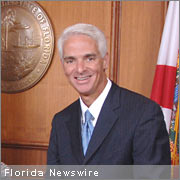NORTH MIAMI /Florida Newswire/ — As part of his ongoing effort to ensure Florida receives its fair share of federal funding and representation, Governor Charlie Crist today kicked off the Census in Schools campaign, encouraging all students to help create awareness about the importance of the 2010 Census. Governor Crist was joined by U.S. Representative Debbie Wasserman Shultz, North Miami Mayor Andre Pierre and Miami-Dade County Public Schools Superintendent Alberto Carvalho at North Miami Senior High School for today’s event.
 “The people of Florida represent a rich legacy of diverse cultures, backgrounds and experiences, and we want to be represented accordingly,†said Governor Crist. “Florida families should participate in the 2010 Census to ensure our state receives the funding necessary to meet the needs of our citizens.â€
“The people of Florida represent a rich legacy of diverse cultures, backgrounds and experiences, and we want to be represented accordingly,†said Governor Crist. “Florida families should participate in the 2010 Census to ensure our state receives the funding necessary to meet the needs of our citizens.â€
During his remarks, Governor Crist emphasized the importance of Florida being represented accurately in the 2010 Census. He noted that the Census determines plans for everything from schools and roads, to senior centers and other government services.
Today’s kick-off event featured students from Arch Creek Elementary School, North Miami Middle School, and North Miami Senior High School. The elementary students read poetry and performed an interpretive dance with Sesame Street characters. The middle school students performed an African dance, and the high school students performed a census skit. North Miami Senior High School’s band also closed the event with a performance.
Timeline for the 2010 Sunshine Census
In February 2009, Governor Crist signed Executive Order 09-41, creating the 2010 Sunshine Census Statewide Complete Count Committee, and appointed 45 Floridians to serve on the committee until December 31, 2010. The Statewide Complete Count Committee mirrors Florida’s diverse population to ensure an accurate count of the people who reside in Florida in 2010 and represents a wide array of community-based and faith-based organizations, local governments, state agencies, media groups and businesses.
During February and March 2010, census questionnaires will be mailed or delivered to every household throughout Florida and are due to be returned by mail by Census Day, which is April 1, 2010. These short forms take only minutes to fill out, and will have an impact on Florida’s future for the next 10 years. Between April and July 2010, census takers will visit households that did not return a questionnaire by mail.
Information obtained by Census Bureau employees is kept, by law, strictly confidential for 72 years. Census Bureau employees have taken an oath to protect confidentiality and are subject to a jail term, fine – or both – for disclosing any information that could identify a respondent of a household.
In December 2010, the Census Bureau will deliver population counts to the President of the United States for apportionment, the process of proportionately dividing the 435 seats in the U.S. House of Representatives among the 50 states.
About the Census
Conducted every 10 years as required by the U.S. Constitution, the 2010 Census is a count of everyone living in the United States. Census data is used to determine Congressional seats to states, to choose available community services, and to allocate more than $400 billion in federal funds to local, state and tribal governments annually. The 2010 Census consists of 10 questions, taking about 10 minutes to complete and will be one of the shortest questionnaires to date. Confidentiality of respondents and the information they provide is protected by strict confidentiality laws.
The first nationwide census was taken in 1790 by the U.S. marshals on horseback and counted 3.9 million people. The first Florida census was taken in 1830 when Florida was still a territory and counted 34,730 people. The most recent census was taken in 2000 and counted more than 281 million people nationwide and approximately 15.9 million in Florida. When the census first began in 1790, its sole purpose was to determine the number of seats each state had in the U.S. House of Representatives. Today, in addition to this purpose, the U.S. Census also affects the amount of federal funding received by the states, counties and cities.
For more information, please visit www.SunshineCensus2010.com.
